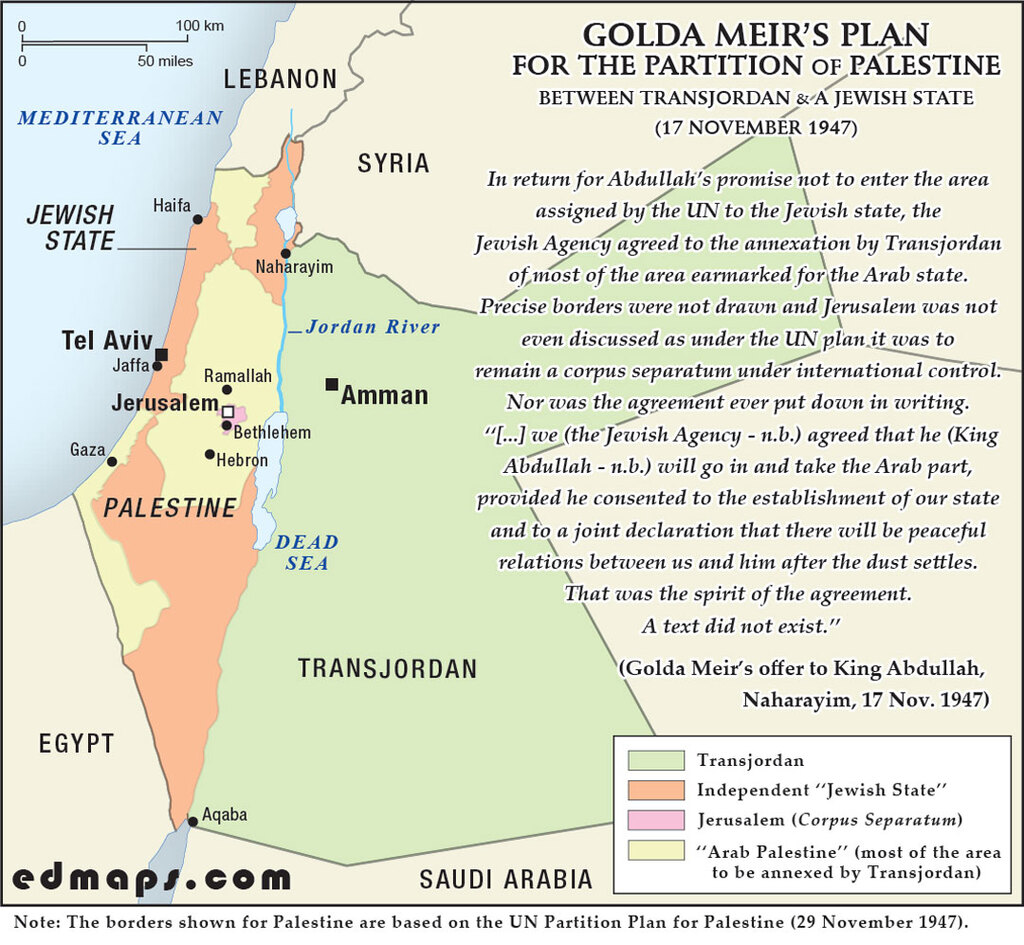
In November 1947, Golda Meir, then head of the Jewish Agency’s Political Department, met King Abdullah I of Transjordan at Naharayim, a location on the Jordan River, to discuss the impending United Nations partition plan for Palestine. This plan, voted on November 29, 1947, proposed creating separate Jewish and Arab states. During the meeting, Abdullah expressed alignment with Zionist interests, promising not to join Arab states in attacking the proposed Jewish state. He aimed to annex the Arab-designated areas of Palestine to expand his kingdom, a plan Meir did not oppose if it ensured peace. However, he suggested the Jews accept autonomy within an enlarged Jordanian state, which Meir firmly rejected, insisting on the establishment of an independent Jewish state and, as an act of goodwill intended to improve relations and communication between Arabs and Jews in the Middle East, the annexation of Arab Palestine by Transjordan.

The November 1947 meeting between Golda Meir and King Abdullah I at Naharayim represents one of the most crucial yet underexplored diplomatic encounters in the lead-up to Israeli independence. As head of the Jewish Agency's Political Department, Meir approached this secret rendezvous with a clear strategic vision that would fundamentally shape her response to both the impending UN partition vote and Abdullah's territorial ambitions. Her position during these negotiations reveals not only her unwavering commitment to Jewish statehood but also her pragmatic understanding of regional realpolitik.
The timing of this meeting was particularly significant, occurring just weeks before the United Nations' historic vote on November 29, 1947, which would propose the creation of separate Jewish and Arab states in Palestine. Meir understood that the success of any partition plan would depend not merely on international recognition but on the practical arrangements that could be negotiated with neighboring Arab leaders, particularly Abdullah, whose Transjordanian kingdom bordered the proposed Jewish state.
During the Naharayim discussions, Meir encountered a surprisingly accommodating Abdullah who expressed alignment with Zionist interests and crucially promised not to join other Arab states in attacking the proposed Jewish state. This assurance was invaluable to Meir, as it potentially removed one of the most formidable military threats facing the nascent Jewish state. Abdullah's motivation was transparently self-interested: he aimed to annex the Arab-designated areas of Palestine to expand his Hashemite kingdom, effectively preventing the creation of a Palestinian Arab state under the leadership of his rival, the Grand Mufti of Jerusalem.
Meir's response to Abdullah's annexation plans demonstrated her sophisticated diplomatic calculus. Rather than opposing his territorial ambitions, she indicated that the Jewish leadership would not object to Transjordanian control over Arab Palestine, provided this arrangement ensured peace and stability. This position reflected her pragmatic assessment that a stable, moderate neighbor was preferable to a potentially hostile Palestinian state under radical leadership.
However, when Abdullah proposed that Jews accept mere autonomy within an enlarged Jordanian state rather than independent statehood, Meir's response was unequivocal rejection. Her insistence on the establishment of an independent Jewish state reflected not only ideological commitment to Zionist principles but also practical recognition that Jewish survival and prosperity required sovereign control over their destiny.
Remarkably, Meir went further, suggesting that Transjordanian annexation of Arab Palestine could serve as "an act of goodwill intended to improve relations and communication between Arabs and Jews in the Middle East." This proposal revealed her broader vision of regional cooperation based on mutual recognition of legitimate interests rather than zero-sum competition.
Meir's approach at Naharayim ultimately proved prescient, as Abdullah's subsequent annexation of the West Bank following the 1948 Arab-Israeli War largely fulfilled the arrangement she had envisioned during their secret meeting.